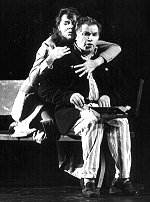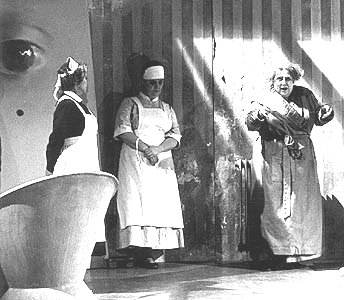
It is always a pleasure to See and Hear WNO productions in Oxford.
Tchaikovsky's masterpiece The Queen of Spades, with its wonderfully
lush and complex orchestration, benefited from the superb acoustics at the
Apollo Theatre. With the orchestra barely below the front of the stage, every
note rang out. The musicians, for once not buried in a pit, could turn round
and, when not otherwise engaged, observe the goings-on behind them - they
were fascinated to watch Herman in bed with a skeleton!)
The conductor, Anthony Walker, achieved a perfect balance and the singers' voices floated over the orchestra with clarity and, seemingly, effortlessly. Vitali Taraschenko (Herman), Susan Chilcott (Lisa), Susan Gorton (The Countess) and the supporting cast all turned in fine singing and good acting in Richard Jones' production, given with helpful surtitles.
The Queen of Spades was first performed in St.Petersburg in 1890. The descent into madness and death of Hermann - hero, or anti-hero - can be seen as more than a personal drama. In the background to this work, as to many others in 19th century Russia, lie a general malaise and the repeated attempts (and failures) towards social and economic reforms, which gathered pace as industrialisation took hold across Europe.
Lisa & Herman
Lisa and
Herman
But there is a problem with this production and its setting in the
post-revolutionary period. Although praised to the skies in most reviews,
for us it bore no comparison with the production admired in Stuttgart last
February
. It does not make historical sense to have the countess hankering after
the good old days (a fundamental aspect of this drama) and the good old days
being represented by the 18th century aristocratic world of Mme.
de Pompadour in a 1930's setting. This staging misses the point of the
realisation that the good old times have gone and nothing worthwhile is in
their place; very real elements in 19th century Russian society
where social, political and economic institutions were crumbling.
The sense of threat, powerlessness and descent (in this opera into madness and death all round) cannot be replicated within a setting in post-revolutionary Russia where an up-beat socialist realist culture had taken hold, side by side with terror and ruthlessness. In this staging the emotional force of the drama was largely lost. The almost uniform drabness of the costumes and stage picture in predominantly cold blues was not counterpointed by positives from a real or imaginary past or present The resultant lack of deep meaning manifested itself when the audience was confronted with the coup-de-theatre, the skeleton of the Countess in bed with Herman. They seemed neither shocked nor provoked to sympathy but responded with hilarious laughter. A wrong note, but that note was elicited by this production.

The Countess Photos: Clive Barda
Alexa Woolf